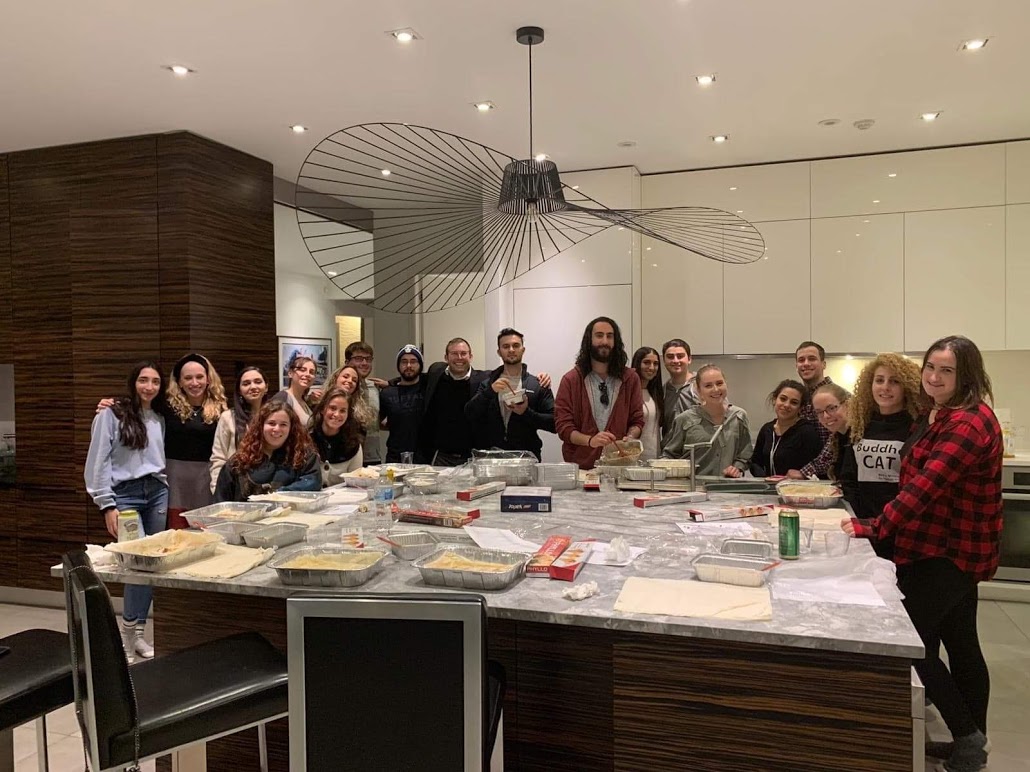This past week I had the amazing opportunity to run a joint self-fulfillment workshop and culinary masterclass to a group of students and young professionals part of Aish HaTorah.


Giving a class to these incredible individuals on such a critical topic was truly an exhilarating experience. In a culture where social media plays an exponentially increasing influential role, comparison to other people and their lives can lead to feelings of unfulfillment and allows self-doubt to take over.
What is self-fulfillment?
Self-fulfillment stems from finding a balance, neither mania or depression, but rather a grounded state where we are comfortable with who we are, accepting ourselves, our strengths, as well as recognize our opportunities to improve. When we are fulfilled we set realistic goals that are important to us, celebrating our accomplishments while being able to give ourselves critique to assist self-growth.
So how do we reach fulfillment?
The task to reach self-fulfillment is not a simple one – it does not actualize overnight. There are several categories that one must address:
- A lifetime VS. a snippet
Everything in our life must end, and to each individual, there is only one thing that is eternal; ourselves. Everyone else that enters our life is temporary, and whether it is a long temporary or a short one, their presence in our lives must one day cease (this too shall pass). If everyone who enters our lives is temporary, why would we not always value the eternal opinion? Everything must end, but our relationship with ourselves is permanent. For this reason, I believe that it is crucial for us to put our own opinion of ourselves above all others.
2. Speaking to ourselves or speaking to a loved one; what’s the difference?
It seems almost ingrained in some individuals to speak much more critically to ourselves than to those we care about. Is this not an urgent issue that we must address? If we are spending our lifetimes with ourselves, wouldn’t we want to speak in the most supportive, understanding, and motivational way in order to accomplish the greatness we are capable of? When we speak to ourselves, the tone we use directly correlates to our opinion of ourselves and subsequently what we believe we can accomplish. If we desire to reach our goals, it is essential to believe in ourselves and our abilities to reach them. Therefore, we must learn to speak with ourselves the way we would with a good friend or loved one; with support, understanding, and patience. Self-fulfillment means that we increase our positive affirmations and daily gratitudes while avoiding self-devaluation, negative self-thoughts, or settling for less.
3. Progress
We differ from artificial intelligence because we take the time to learn or finish tasks, it’s what makes us human. Every journey and task that we embark on requires a certain level of time and effort that varies by difficulty. When setting goals, we are eager to see instant results. It is essential to remember that we are en route to success and that it comes in parts. Success rarely comes altogether; Rome wasn’t built overnight. It can be easy to give up in the middle or just prior to accomplishing our goals. Self-fulfillment comes when we are able to accept that progress can differ throughout stages. Whether rapid or slow, progress means that we are on track and we must celebrate our accomplishments at different stages. We must avoid delegitimizing or invalidating our progress because we compare ourselves to others who seemingly display faster or greater progress. Comparison is the root of feelings of inadequacy and allows the intruder effect to take over, responsible for making us feel like we don’t belong or underqualified. We are fulfilled when we are aware that our progress is valid and leading us to our goals, and when we can give ourselves positive feedback to ensure or increase future progress, without comparing it to anyone else but ourselves.
4. Actions and goals
We judge others by their actions and ourselves by our intentions. Just as it is important to be proud of our accomplishments and strive towards our goal, it is equally important to remember that other people are also on a journey, and many haven’t reached their peak just yet. While we consider our own reasoning and purpose for certain actions, we often take note of the direct actions of others without concern for their venture. Proper self-critique and an understanding, empathetic, outlook can guide us on becoming the best version of ourselves while assisting others to reach their version of self-actualization. We are a pack animal; we yearn for the support from others. The saying “don’t look into someone else’s bowl unless you are checking if they have enough” goes both ways; don’t look to compare your life to theirs. The success they have reached or accomplishments they have fulfilled came with consequences, difficulties, struggles, and work that we may be completely unaware of. We are also on the way to success just as they once were. Similarly, we must be empathetic and supportive of them and their journey. If they are not as successful or accomplished as we believe they should be, we once again must acknowledge that everyone is going through an intensive journey, and we may not be aware of the struggles they have faced. Providing understanding, empathy, and support will assist them with reaching the greatness that they are capable of. It is important to keep in mind the difficulties others go through and to never assume or judge to conclusions on the abilities or disabilities someone has. It is also not our place to determine this for someone else. Self-fulfillment comes when we focus on being the best version of ourselves while supporting others on their personal path.
Self-fulfillment allows us to reach and surpass our goals and dreams. You deserve fulfillment. Everyone is on a unique path, and changing our inner voice to one that is supportive and encouraging can propel us to our goals.




